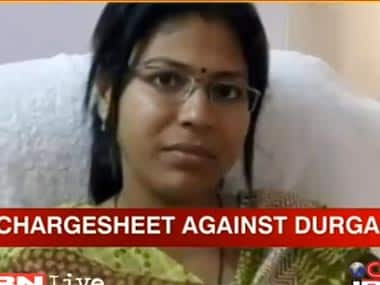Smooth roads in Mumbai are a dream. AFP
An auditor only audits one’s account and points to the errors, wilful or inadvertent, to keep the sanctity of accounting – and accountability – intact. Even the best of auditors do not keep your account books. To expect them to write your books, especially if you are a public body, is absurd. In the same way, the Swiss audit firm roped in as third party auditors of the Mumbai roads built and maintained by the civic body, can only point to the shoddy work. They, SGS Consultants, cannot build better roads. Their revelations should lead to rectifications which would result in improved roads. But that is not the way Municipal Corporation of Greater Mumbai or the standing committee chairman, Rahul Shewale, looks at it. To him, the Mumbai roads are battered into potholes because they reflect “the poor quality of their report”. They have audited the roads for two years and “yet the roads have worsened”. The high court in February last year had refused to stay the group’s appointment. The court had believed that bids could mean a possible sabotage by contractors who may set up others to apply with lower quotes. That would jeopardise the purpose of audits. This year, the standing committee has refused to renew the contracts and seems to be in the mood to shoot the messenger. In a court hearing, a counsel, Iqbal Chagla had said then, according to a Times of India report, that SGS had found contractors laying roads that were thinner by half of the norm. Shoddy materials were used and a concrete mix that did not meet approval was used. The civic body apparently has not responded to the audit reports, though its own audit since 2005 has not led to any change for the better in the quality of roads. That is why SGS, a Geneva-based consultant, was brought in. He was not brought in as a road builder. Nor was it asked to interact with the road-builders awarded contracts by the MCGM and enforce standards.That is entirely the responsibility of the civic body. But the refusal to stop pocketing money, refusal to share profits made by the contractors, and that way intentional poor quality of the surfaces we drive on and curse at the potholes and the civic body, seems firm. Heeding the audit reports would mean the killing of the goose that lays the golden eggs, every year. This should convince us that every dawn brings around the realisation of living in a strange world in India. So odd are the daily situations that if Lewis Carroll were to be living here and watching the scenarios, he may not be inspired to write another Alice in Wonderland. His dissuasion would be the predictability of the absurd. This morning’s newspapers were no exception, serving the ridiculous with the tea or coffee, whichever it is you prefer. One did not have to look for them; they just hit the eye with such appalling ease that it only adds to the discomfort of an ordinary citizen of ordinary prudence. The conclusion: disorder is a constant. Take the insistence of the government telling the Supreme Court that the Central Bureau of Investigation needed prior sanction from the authorities if it were to investigate officials above the rank of a joint secretary. It is as if this category had an in-built immunity till the political executive abandons them to their fate. The apex court, of course, had to make it known that when it was monitoring a case, as the 2G scam, no one needed to be asked for sanction for probing them, much less even consulted. When the court was superintending, it is apparent it is being done to avoid all hurdles. Indian law enforcement is therefore weak. But does it matter to those who need to save their skins? Prudence, morality, probity are perhaps not the elements one should any more expect in Indian public life, it would certainly seem. Logic can be twisted out of shape to provide perverse explanation for bad conduct, abuse and unfounded accusations are the normal means of protecting ones back. Examples abound; you may find it every day in the morning papers and on chat shows the night before. Let us run through a few of them. [caption id=“attachment_1005899” align=“alignleft” width=“380”]  Durga Nagpal has been suspended. Image courtesy: Ibnlive[/caption] One. The country has been crying for a decriminalised law-making apparatus and recently, the Supreme Court outlawed the presence of convicted criminals in the law-making bodies. The idea is that criminals ought not to be making laws, for fear that they would make laws, or refuse to make laws, that are convenient to them; the country be damned. However, the entire political spectrum has risen with one voice against it, citing the risk that a disqualified elected member may lose his office if he were to be subsequently acquitted on appeal. But despite the rise in criminality in the political sphere, the community of politicians now want to undo the apex court’s order which keeps tainted politicians out of reckoning. Two. Not only that, though they claim to represent the people, and speak of their eminent role in keeping Indian democracy working, they refuse to disclose how they conduct their affairs, especially their finances. Finances, its illegal collection, and criminality and corruption together make Indian politics murky. They together have sabotaged the system. This is no exaggeration. Therefore, to keep themselves safe, they want to neutralise the Central Information Commission order requiring them to come under the ambit of the Right to Information Act, touted as one of the biggest steps in democratising public life. Accepting it would be a suicidal risk. They would like to keep their flocks safe from prying eyes so they could keep serving – their claim – the people. Three. Durga Shakti Nagpal, the young UP IAS official is suspended for steps that may have jeopardised communal harmony – though they actually did not – because the chief minister needed to side with the sand mafia she targeted earlier. However, communal clashes between Shias and Sunnis in Lucknow has seen no such punishment being meted out to any single official. Instead, a politician gloats in public about having her suspended around midnight ‘by a phone call to the chief minister’ and another, Naresh Agarwal, laments at the poor training of the IAS cadre. Home Minister Sushilkumar Shinde wants ‘bureaucracy to work under the ambit of law’. Beg your pardon, Mr Shewale, Mr Agarwal, Mr Shinde. The law applies to all, especially the law makers as much as law enforces. But from the time the issue of Lokpal blew up in their faces at Janpath, the country knows who wants to shield themselves from the law and make merry.


)
)
)
)
)
)
)
)
)



